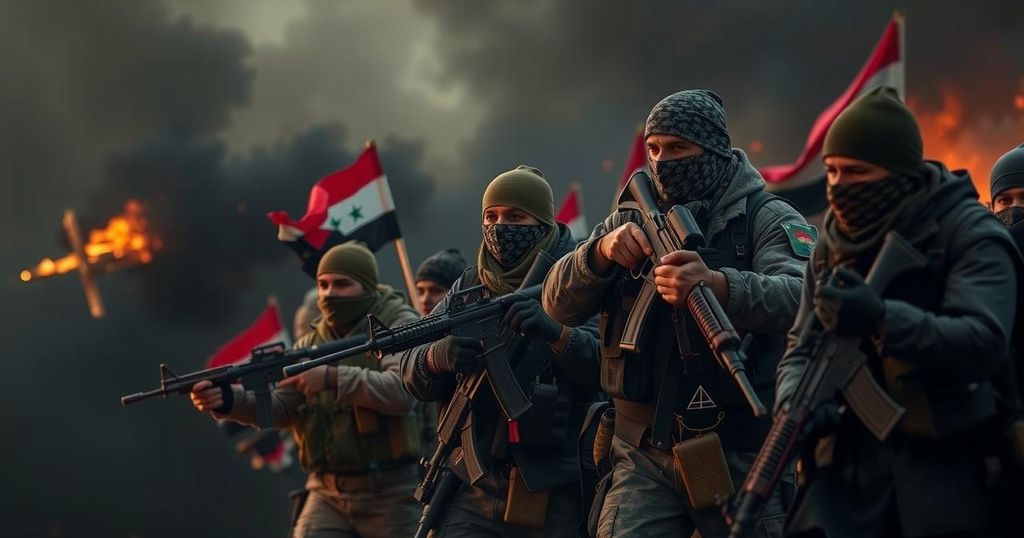Syria’s Rebels Gain Ground Amidst Weakened Support for Assad

The recent capture of Aleppo by Syria’s rebels signifies a pivotal shift in the civil war, fueled by diminished support for the Assad regime from allies like Iran, Hezbollah, and Russia. The rebels, seizing the opportunity provided by their adversaries’ distractions, have successfully advanced into key territories as Assad’s military struggles to maintain control amidst internal divisions and external conflicts.
The recent successes of Syria’s rebels highlight a significant shift in the ongoing civil conflict, driven by the decreased support for the Assad regime from its allies, namely Iran, Hezbollah, and Russia. For over a decade, President Bashar al-Assad maintained control largely due to the military assistance provided by these allies. However, the current geopolitical landscape has shifted, enabling opposition forces to launch a surprise offensive while Assad’s coalition faces internal difficulties and distractions.
In a swift and unexpected campaign, rebels captured nearly all of Aleppo, one of Syria’s major cities, creating a substantial territorial gain across western and northwestern regions of the nation. Analysts attribute the recent offensive’s success to the vulnerabilities that have emerged within Assad’s formerly robust coalition.
The Syrian civil war has its roots in a violent crackdown on peaceful protests that began thirteen years ago, sparking a multifaceted conflict with competing factions vying for control. Throughout the years, Assad’s regime benefited from military aid from Iran and Hezbollah, along with direct Russian intervention that proved pivotal post-2015. However, recent developments—such as increased Israeli airstrikes against Hezbollah and Iran, and ongoing Russian commitments to the war in Ukraine—have notably weakened Assad’s support network.
As Hezbollah faces significant losses due to its confrontational engagements with Israel, and with Iran grappling with complex challenges at home, Assad is left more isolated than ever. Furthermore, shifts in alliances, particularly a recent ceasefire agreement between Hezbollah and Israel, allowed opponents to feel emboldened by the deteriorating position of Assad’s allies. Analysts state that the rebel groups had been strategically planning for months, ready to exploit these geopolitical shifts at a moment’s notice, leading to their remarkable advancements on the battlefield.
Notably, the internal dynamics of Syria exacerbated Assad’s vulnerabilities, as his government struggled to deliver economic recovery, failed to unify the war-torn nation, and failed to command the loyalty of conscripted soldiers, many of whom chose to flee rather than fight back against organized rebel forces. This recent offensive underscores the shifting front lines and the unpredictable nature of alliances and conflicts not only within Syria but also influenced by broader regional and international confrontations.
Rebels capitalized on the perceived momentum as conditions within Syria began to favor their advances and observers speculate this may represent a fundamental shift in the Syrian conflict—a power transition that could alter the landscape for years to come.
The Syrian civil war, which has endured for thirteen years, initiated from peaceful protests against the Assad regime’s authoritarian rule and evolved into a protracted armed conflict involving various rebel groups and foreign powers. Initially, Assad maintained control with the help of military support from Iran, Russia, and Hezbollah. However, recent geopolitical dynamics, including military alignments and altered engagements among these allies, have significantly impacted the support structure crucial for sustaining Assad’s regime. As of late 2023, the engagement of foreign allies has been complicated by their respective challenges—Russia’s ongoing conflict in Ukraine, Iran’s retaliatory measures against Israel, and Hezbollah’s involvement in skirmishes along the Israeli border all contribute to a distracted support system for Assad. The changing circumstances have created a window of opportunity for the rebels, who are now strategically positioned to advance and potentially alter the balance of power in the Syrian civil war.
In summary, Syria’s rebels have seized a pivotal opportunity amid the weakening of Assad’s coalition, evidenced by their rapid territorial gains. The withdrawal and distractions of key supporters—Iran, Hezbollah, and Russia—have created vulnerabilities within the Assad regime, allowing opposition forces to launch a successful offensive. This unforeseen shift points to a potentially transformative moment in the Syrian civil conflict that may usurp control from the Assad regime and reshape the future landscape of the region.
Original Source: www.nytimes.com






